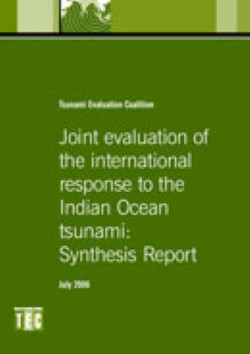Joint evaluation of the international response to the Indian Ocean Tsunami : Synthesis report
About the publication
- Published: July 2006
- Series: Joint evaluation
- Type: Evaluations
- Carried out by: --
- Commissioned by: --
- Country: Indonesia, Maldives, Sri Lanka, Thailand
- Theme:
- Pages: 174
- Serial number: --
- ISBN: 0 85003 807 3
- ISSN: --

This Synthesis Report is the outcome of an international collaborative process involving over 40 humanitarian and development cooperation agencies. It's supported by Norad.
This synthesis is based on five thematic studies, each undertaken by one or more independent evaluation team/s. The evaluations involved in-depth country case-studies, beneficiary surveys and extensive consultations with stakeholders. The report also benefits from a wealth of secondary sources produced on the tsunami response.
Findings:
*First, one must do better at utilizing and working alongside local structures. With nothing but good intentions, the international community descends into crisis situations in enormous numbers and its activities too often leave the very communities we are there to help on the sidelines. Local structures are already in place and more often than not the 'first responders' to a crisis. The way the international community goes about providing relief and recovery assistance must actively strengthen, not undermine, these local actors.
*Second, one must find the will and the resources to invest much more in risk reduction and preparedness measures. Local structures and local measures - whether part of national or provincial government efforts or embedded in the communities - need to be strengthened to reduce vulnerabilities to tomorrow's disasters. And international and local actors need to forge solid partnerships between and among themselves, well in advance of their being tested in crisis.
*Third, one must translate good intentions into meaningful reform. The report identifies critical systemic challenges for the humanitarian community, many of which were analyzed at length in the aftermath of the Rwanda crisis and have already been included in a range of standards and codes of conduct. But the fact that we continue to struggle to turn these principles into practice, as this report highlights, demands that we set about on our shared agenda for reform with the courage and commitment necessary to see the process through to full implementation.
